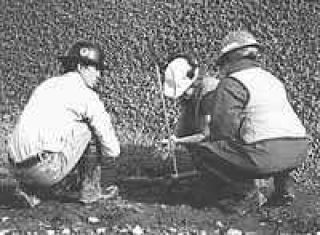ENUMCLAW _ In an effort to address concerns about
hard-rock blasting at the Snoqualmie Sand and Gravel pit, residents living next to
the gravel operation and county officials took a bus trip Nov. 3 to a quarry
in Enumclaw to see firsthand how the rock is mined.
Representatives from Glacier Northwest — the company that
owns the Snoqualmie gravel pit — Subterra Inc., Associated Earth Sciences
and Weyerhaeuser also attended the demonstration. Subterra and
Associated Earth Sciences are engineering firms hired by Glacier Northwest.
The event was sponsored by Glacier officials, who hoped
neighbors would see that blasting impacts are minimal to the surrounding
area, thereby easing some residents’ apprehension about the company’s plans
to blast at the Snoqualmie gravel pit.
“It was an educational thing to educate and answer questions,”
said Ken Johnston, plant superintendent at the Snoqualmie pit.
Glacier Northwest, a major state supplier of sand, gravel and
landscaping rock, plans to blast hard rock at its 270-acre site, located next
to Weyerhaeuser off 396th Drive Southeast in Snoqualmie.
Currently, the county is reviewing a proposal to revise Glacier’s
permit to not only include blasting up to three times per week, but also to
increase the pit’s hours to four more per day and extend the operation’s life
beyond the year 2050.
Homeowners whose property lines are 300 feet to a few miles from
the gravel pit, which has existed for decades, have expressed concern
over the proposal. They’ve listed noise, vibration, extra truck traffic, stray
rocks, damage to underlying aquifers and decreasing property values as
possible impacts on their neighborhood and properties if the plan is approved.
But Glacier officials stress that when done correctly, blasting has
very little vibration and noise impacts.
Neighbor Neil Dubey, whose property is one of the closest
to Snoqualmie Sand and Gravel, said the blasting demonstration in
Enumclaw didn’t have much of an impact on him.
“It was kind of exciting to see it,” he said. “It didn’t really bother me.”
Dubey said he’s not upset about Glacier’s plans, adding that as a
lifelong Valley resident, the logging trains that used to run through town
were much louder than a blast could ever be.
However, neighbor Laura Kelley said the demonstration reinforced
her concerns and gave her little hope that the project would not have an
affect on her property.
“To me it’s very discouraging,” she said, explaining that she feels the
noise from the blast and the warning horns could be dangerous when
riding horses nearby.
“I could feel it. It gave me a shake, and I could feel the air blast,”
said neighbor Diane Brace, who stood closer to the blast so she could
feel the vibration. “What concerns me is that I could feel the air blast and
I’m worried that it could bounce off the clouds on a cloudy day and
project back on people and buildings.”
Air blasts are pockets of air forced from the blasting area, much like
the rush of air people feel when a door is slammed.
Glacier General Manager Ron Summers said air blasts pose no
danger and explained that the Enumclaw blast was 10 to 20 percent larger
than what will be done at the Snoqualmie site.
The blast lasted less than two seconds and resulted in
approximately 10,000 tons of large rock. The vibration from the blast registered
lower than the state requires.
Maury Hamerly is a Snoqualmie Sand and Gravel neighbor who
also works for the company. He performs maintenance for the operation’s
rock crushers and other machines.
“It wasn’t bad. I thought it would be worse,” he said.
“I’ve worked for a lot of companies, and Glacier really tries to
take care of noise problems,” he explained. “They really listen, and I
should know.”
Hamerly said the company has taken steps to reduce noise at the
site, adding that he helped install sound barriers around the operation’s
rock crushers. In addition, a warning horn is scheduled to be moved because
it’s too high in the air, and trucks with loud engines are not used anymore.
Metropolitan King County Councilman David Irons Jr. has been
around blasts before while working on the Alaska pipeline after college, and
he said the blast was about what he expected.
Yet he is against implementing a blasting program in Snoqualmie
because of the proximity of homes to the operation.
“There is 50 years’-worth of gravel in there, so mine that,” he said of
the existing operation. “I’m not convinced that it’s necessary at this point in time.”
He added that since the Enumclaw quarry produces large rock
already, perhaps Glacier could just use rock from there.
Several residents suggested that the gravel company created a
gentler blast than what will be done at Snoqualmie, but Glacier
representatives denied such an action.
“We’re in business all over King County,” Summers explained.
“Yes, we could have made it go that way, but we didn’t. You’re only as good
as your word and we work off reputation.”
However a few neighbors are still wary.
“I imagine they presented us with the best-case scenario,” Brace said.


